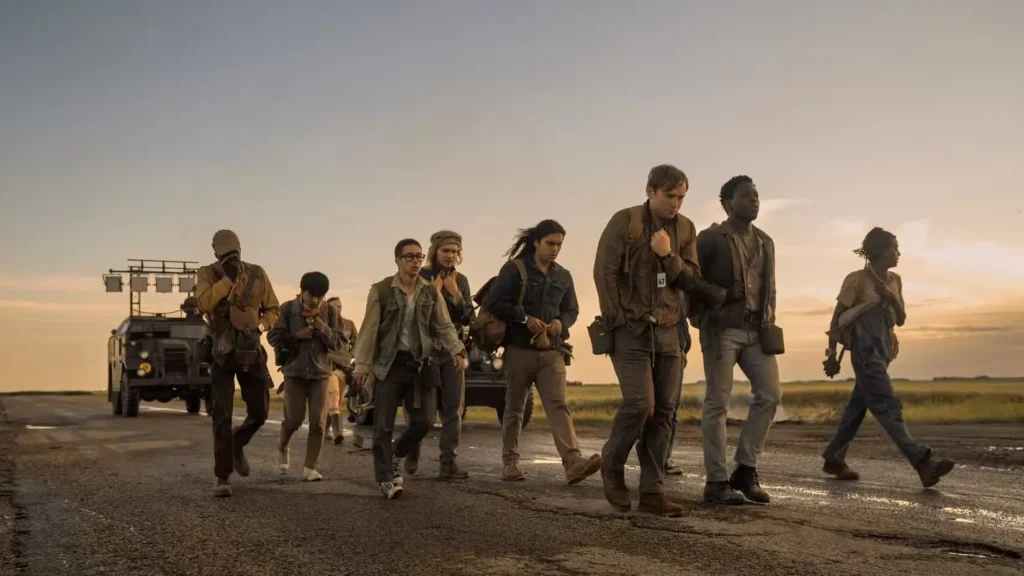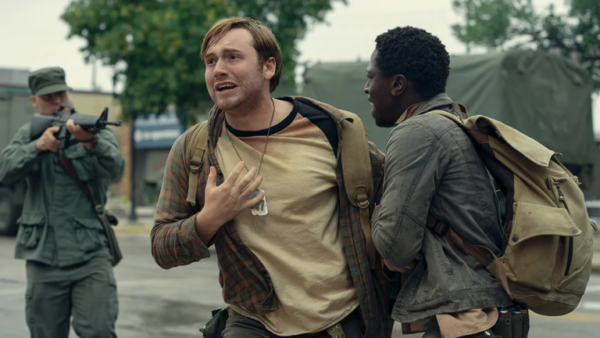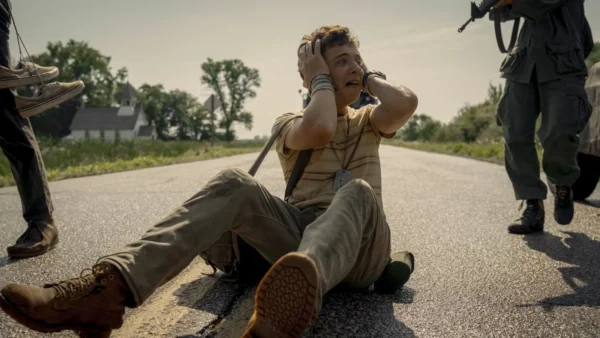Stephen King’s The Long Walk has always been one of his darkest tales. Published under his Richard Bachman pseudonym, the novel was a chilling study of endurance and control. In 2025, director Francis Lawrence (The Hunger Games fame) finally brought this story to the screen. Fans wondered if the film would stay faithful to the bleak book, or if Hollywood might bend the tone.
The result? A bold adaptation that twists King’s infamous finale into something shocking, emotional and strangely hopeful. The Long Walk ending doesn’t let viewers off easy, but it does leave them with a spark of defiance rather than pure despair.
⚠️ Spoiler Alert: From here on out, we’re unpacking the final act of The Long Walk. If you haven’t seen the movie yet, this is your warning, major spoilers ahead.
The Final Showdown
As the Walk grinds to its last steps, only Garraty and McVries remain. Both are exhausted, both are broken, yet they still lean on one another. The film doesn’t present them as rivals but as two boys tied together by shared suffering.
When Garraty begins to falter, McVries makes a desperate choice: he tries to sacrifice himself so that Garraty can win. But Garraty, in one last burst of fight, urges him to keep going. Instead of watching his closest friend collapse, Garraty helps McVries take those final steps. The Walk ends with McVries declared the sole survivor, but the victory feels less like a prize and more like a pact between the two.
A Winner’s Wish

Tradition says that the winner of the Walk is granted anything they want. In the book, the “prize” is left abstract, but the movie gives it a pointed twist.
McVries remembers a promise he made with Garraty, that if either of them won, they wouldn’t ask for money, power or freedom. They would use their wish to bring down the man behind it all, the Major!
And so, in front of the military, the cameras and a stunned crowd, McVries does the unthinkable. He asks for a rifle. The soldiers hesitate, but protocol forces them to comply. McVries raises the weapon, turns and shoots the Major. It’s swift. It’s shocking. And it’s exactly the kind of ending that flips the entire story on its head.
Also, read Eddington Ending Explained: Lies, Control and the Cost of Ambition
What The Long Walk Ending Means
The Long Walk ending in the film reframes the story. Where the novel left readers with ambiguity and madness, the adaptation offers rebellion.
By killing the Major, McVries rejects the very premise of the Walk. He takes the “Prize” and weaponizes it against the system that demanded their suffering. This isn’t about survival anymore, it’s about exposing the cruelty and refusing to let the cycle continue.
The act also carries a heavy cost. It’s implied that McVries won’t live past that moment. But his death isn’t meaningless. It’s a declaration. A statement that even inside a machine designed to strip away humanity, one boy can still say no.
Friendship as the True Prize

The heart of the movie isn’t the gore, the marching, or even the rebellion. It’s the relationship between Garraty and McVries. Their bond is what drives the finale. Garraty pushes McVries to live and McVries carries Garraty’s will into his last act.
In this way, the film suggests the real prize isn’t wealth or fame. It’s a connection. It’s choosing someone else over yourself in a world built on cruelty. That message lands powerfully in today’s climate, where stories of resistance and solidarity feel more vital than ever.
How The Long Walk Movie Ending Differs From The Book
Fans of King’s novel will notice the shift immediately. The book’s ending is hauntingly bleak, with Garraty running into oblivion, unable to stop even after “winning”. It’s more about psychological collapse than rebellion.
The film, by contrast, gives audiences a different flavor of horror. Instead of endless despair, it offers a defiant moment of rebellion, one that ends in blood but also in a spark of hope. This choice might divide fans, but it undeniably makes the story more cinematic and visceral.
Why The Ending Resonates

The Long Walk ending works because it feels earned. We’ve watched these boys suffer for hours, seen them stripped down to nothing. To give them one last flicker of control feels cathartic.
It also ties neatly into Francis Lawrence’s filmmaking style. Much like in The Hunger Games, he’s less interested in glorifying survival than in highlighting resistance against systems of exploitation. The Walk isn’t just a deadly game anymore, it’s a battlefield where solidarity matters more than winning.
Also, read Night Always Comes Ending Explained: False Victories, Family Betrayal and Choosing Yourself
Final Thoughts
The Long Walk ending is brutal, bold and deeply human. McVries’s choice to shoot the Major instead of claiming a hollow victory transforms the story from nihilism to rebellion. Garraty’s push to keep his friend alive ensures that their suffering isn’t forgotten, and their bond becomes the story’s true legacy.
It’s not a fairy-tale ending. McVries almost certainly dies in the aftermath. Garraty is left broken, both spirit and body. But the act of defiance lingers. It turns The Long Walk from a story about inevitable loss into one about the small, powerful ways ordinary people can fight back.
For fans of King, it’s a fascinating adaptation, less faithful in tone, but no less impactful. For moviegoers new to the story, it’s a gut-punch finale that lingers long after the credits roll.
FAQs
1. How does The Long Walk movie ending differ from the book?
The book ends with Garraty lost in madness, endlessly running. The film ends with McVries shooting the Major, a shift from despair to rebellion.
2. Does McVries survive after killing the Major?
The movie doesn’t show his exact fate, but it’s heavily implied he doesn’t live long. His act is more symbolic than practical.
3. Why does McVries shoot the Major?
He honors the pact he made with Garraty. Instead of claiming a selfish prize, he uses his wish to destroy the symbol of oppression.
4. What is the message of The Long Walk ending?
The film argues that human connection and resistance carry more weight than survival alone. It’s about dignity in the face of cruelty.